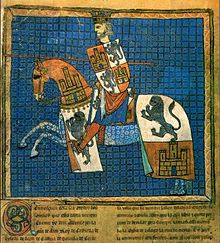Alfonso X of Castile
| Alfonso X | |
|---|---|

Portrait of Alfonso X from the codex Tumbo 'A' de Santiago (Dated between 1129 and 1255)
|
|
| King of Castile and León | |
| Reign | 1 June 1252 – 4 April 1284 |
| Predecessor | Ferdinand III |
| Successor | Sancho IV |
| Born |
23 November 1221 Toledo |
| Died | 4 April 1284 (aged 62) Seville |
| Burial | Cathedral of Seville |
| Consort | Violant of Aragon |
| Issue among others... |
Beatrice, Marchioness of Montferrat Ferdinand de la Cerda Sancho IV |
| House | Ivrea |
| Father | Ferdinand III of Castile |
| Mother | Elisabeth of Hohenstaufen |
| Religion | Roman Catholicism |
Alfonso X (also occasionally Alphonso X, Alphonse X, or Alfons X, 23 November 1221 – 4 April 1284), called the Wise (Spanish: el Sabio), was the King of Castile, León and Galicia from 30 May 1252 until his death. During the Imperial election of 1257, a dissident faction chose him to be King of the Romans (Latin: Rex Romanorum; German: Römisch-deutscher König) on 1 April. He renounced his imperial claim in 1275, and in creating an alliance with England in 1254, his claim on Gascony as well.
Alfonso X fostered the development of a cosmopolitan court that encouraged learning. Jews, Muslims, and Christians had prominent roles in his court. As a result of his encouraging the translation of works from Arabic and Latin into the vernacular of Castile, many intellectual changes took place, perhaps the most notable being encouragement of the use of Castilian as a primary language of higher learning, science, and law. Alfonso was a prolific author of Galician poetry, such as the Cantigas de Santa Maria, which are equally notable for their musical notation as for their literary merit. Alfonso's scientific interests—he is sometimes nicknamed the Astrologer (el Astrólogo)—led him to sponsor the creation of the Alfonsine tables, and the Alphonsus crater on the moon is named after him. As a legislator he introduced the first vernacular law code in Spain, the Siete Partidas. He created the Mesta, an association of sheep farmers in the central plain, but debased the coinage to finance his claim to the German crown. He fought a successful war with Portugal, but a less successful one with Granada. The end of his reign was marred by a civil war with his eldest surviving son, the future Sancho IV, which continued after his death.
...
Wikipedia
